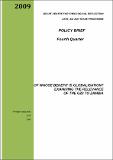Of Whose Benefit is Globalisation? Examining the Relevance of the G20 to Zambia
Date
2009Author
Haang’andu, Privilege
Type
BriefingLanguage
enItem Usage Stats
34
views
views
16
downloads
downloads
Abstract
The G20, unlike other forms of international cooperations like the United Nations, is an informal forum that promotes discussion between industrialised and emerging-market countries on key issues related to global economic stability. The G20, constituted by the nineteen most industrialised countries plus the European Union, represents 66% of the global population and it claims 90% of global gross national product. Further, 80% of world trade occurs among the G20 member countries. The question this policy brief seeks to answer, more especially by attempting to examine the relevance of such cooperations to low income countries like Zambia, is whether the G20 is likely to provide genuine mechanisms for development, cooperation, and inclusion or simply
becomes an instrument of “hegemonic cooperation.” The JCTR is concerned about the impacts such processes as the G20 have on low income countries such as Zambia, especially that so many issues discussed at that level have a bearing on our engagement with policy makers both at the national and the international levels.
Description
The current dynamics of globalisation suggest it is a game between two camps: the rich industrialised countries and the less industrialised poor ones. In its ideal form, however, globalisation is supposed to be the creation of a global environment where the world is becoming a global community with various barriers that inhibit the socio-economic development of nations, peoples, and continents eliminated. Indeed there has been some disappearance of many such structures but there has also been some corruption of ideal globalisation where industrialised countries both dominate and manipulate processes of
development and decision making in their interests at the expense of low income countries. With the disappearance of slave trade and colonialism, we see the emergence of neocolonialism. The strongest meet, in the absence of the rest of the global community, and make binding decisions for the entire world, worse still, decisions that largely exclude the concerns of the majority and do not serve the common humanity. One such forum that convenes the rich countries of the world to discuss matters of development with the obvious absence of poor countries is the G20.
